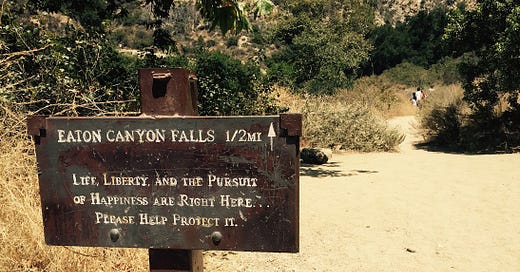Hózhó (Diné/Navajo)
It’s been a hell of a year, and it’s only February. A few weeks ago, fires raged across my city and neighborhood, forcing many people out of the homes they ultimately lost. The smoke has cleared, but blocks are in ruin, and now there are concerns about pollutants in the air and soil. If that’s not enough, the political headlines feel just as toxic, making each day feel like a reminder that the world is both figuratively and literally on fire.
In all of this chaos, I keep thinking about the word hózhó.
Hózhó (pronounced Hoh-zho) is a Diné word that means “walking in beauty” and describes the act of pursuing balance and harmony. It describes living one’s life in a way that is good, healthy, and peaceful. These words — balance, harmony, peace — have become a bit trite in the English language. Maybe that’s what happens when wellness intersects with capitalism, but I guess that’s a post for a different day. The point is, in other languages, words like “harmony” and “wellness” almost seem to carry a different meaning, one that’s more, well, meaningful. In an article published in Global Advances in Health and Medicine, scholars attempt to explain Hózhó:
“Hózhó reflects the process, the path, or journey by which an individual strives toward and attains this state of wellness. Thus, translating the complex meaning of Hózhó without reducing its expansive meaning is difficult.”
At the risk of reducing it, hózhó is not just a state of wellness but also the path toward attaining that wellness. It’s also contextual. As one Navajo speaker put it, “Hózhó is somewhat like a person. It adapts to the situation presented…it has a way of communicating that things will be okay. As we get back in balance with ourselves and our environment, there’s hope and there’s peace.”
In some ways, hózhó feels like resilience, but there’s a quiet defiance to it, too. It speaks to the pursuit of balance and connection when the world feels chaotic and discordant.
For many Indigenous communities, language itself has been an act of resistance. In the late 1800s, for instance, Indigenous children, including the Diné, were sent to government-run boarding schools where they were punished for speaking their native languages. Similar stories exist across countless other languages: Welsh, Cantonese, Gaelic, Ukrainian — the list goes on. Leaders justify these bans in the name of patriotism. But we all know it’s far more insidious than that. It’s a calculated attempt to erase culture, identity, and history.
When a language disappears, entire histories are often erased, and by the time new leaders step in to preserve those cultures, the damage has often been done. Language also shapes how we see the world. So when a language disappears, so does a culture’s perspective — their unique ways of seeing the world and understanding life.
Hózhó is one of those words. It's choosing what is good in the face of what is not. That doesn't mean we have to ignore suffering or force positivity. It seems to be about cultivating a mindset that resists the forces causing that suffering in the first place. The word also reminds me of something I once heard the writer Morgan Jerkins say during a panel discussion on writing during difficult times: I refuse to let the world take my softness. Hózhó is a reminder that even when the world tries to unravel us, we can still walk in beauty, still weave something whole. And, ideally, we can do it together.
Shareworthy
A sociologist shares tips for staying on top of political news without letting it wear you down—exactly what the constant onslaught is designed to do.
Jemaine Clement, a comedian and musician of Māori descent, gets emotional during an interview discussing the painful history of his grandmother being punished for speaking her native language.
I helped out with this Hidden Brain episode on the psychology of pushing through a crisis—what’s going on in our minds when we stay strong in the face of big challenges.
From the archives
How Languages Go Extinct (Catapult): “Destroying a language is also a way of destroying a culture.”
This week’s soundtrack
One Small Thing
This month, one small thing that’s made my life better is
’s podcast, Creative Pep Talk. Big thanks to (another awesome resource for creatives) for sharing this gem. It feels like having a fun yet insightful conversation about creativity with a friend over beers.-Kristin





What a beautiful read, Kristin ❤️ Such a timely piece—I think focusing on this word can help us all reframe the struggles we’re navigating right now. Brava!